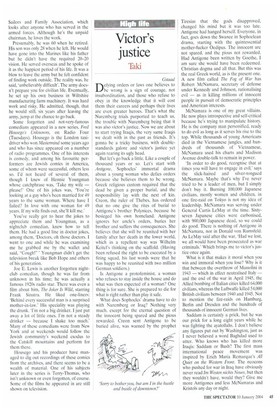Victor's justice
Talu
Gstaad Defying orders or laws one believes to be wrong is a sign of courage, not insubordination, and those who refuse to obey in the knowledge that it will cost them their careers and perhaps their lives are even greater heroes. That's what the Nuremberg trials purported to teach us, the trouble with Nuremberg being that it was also victor's justice. Now we are about to start trying Iraqis, the very same Iraqis we dealt with in the past as friends. It's gonna be a tricky business, with doublestandards galore and victor's justice yet again rearing its ugly head.
But let's go back a little. Like a couple of thousand years or so. Let's start with Antigone, Sophocles' immortal drama about a young woman who defies orders because she believes them to be wrong. Greek religious custom required that the dead be given a proper burial, and the responsibility lay with the next of kin. Creon, the ruler of Thebes, has ordered that no one give the rites of burial to Antigone's brother Polynices, because he besieged his own homeland. Antigone ignores her uncle's orders, buries her brother and suffers the consequences. She believes that she will be reunited with her family after her death in the lower world, which in a repellent way was Wilhelm Keitel's thinking on the scaffold. (Having been refused the right to be executed by a firing squad, his last words were that he was happy to be reunited with two million German soldiers.) Is Antigone a protofeminist, a woman who refuses to stay inside the house and do what was then expected of a woman? One thing is for sure. She is prepared to die for what is right rather than play it safe.
What does Sophocles' drama have to do with Nuremberg or Iraq? Nothing very much, except for the eternal question of the innocent being spared and the pious rewarded. Creon sent Antigone to be buried alive, was warned by the prophet Tiresias that the gods disapproved, changed his mind but it was too late. Antigone had hanged herself. Everyone, in fact, goes down the Swanee in Sophoclean drama, starting with the quintessential mother-fucker Oedipus. The innocent are not spared, and the pious not rewarded. Had Antigone been written by Goethe, I am sure she would have been redeemed. Christian dogma and all that. But this was the real Greek world, as is the present one. A new film called The Fog of War has Robert McNamara, secretary of defense under Kennedy and Johnson, rationalising evil — as in killing millions of innocent people in pursuit of democratic principles and American interests.
McNamara is one of my great villains. He now plays introspective and self-critical because he's trying to manipulate history. He is the company man personified, ready to do evil as long as it serves his rise to the top. While thousands of young Americans died in the Vietnamese jungles, and hundreds of thousands of Vietnamese, McNamara used his charts and Madison Avenue double-talk to remain in power.
'In order to do good, recognise that at times you will have to engage in evil,' says the slick-haired and silver-tongued McNamara. Maybe that's why I've never tried to be a leader of men, but I simply don't buy it. Burning 100,000 Japanese civilians, mostly women and children, in one fire-raid on Tokyo is not my idea of leadership. McNamara was serving under General Curtis LeMay at the time. Sixtyseven Japanese cities were carbonised, with 900,000 Japanese dead, so we could do good. There is nothing of Antigone in McNamara, nor in Donald von Rumsfeld. As LeMay said after the war, 'Had we lost, we all would have been prosecuted as war criminals.' Which brings me to victor's justice once again.
What is it that makes it moral when you win and immoral when you lose? Why is it that between the overthrow of Mussolini in 1943 — which in effect neutralised Italy — and the end of the war in April 1945, the Allied bombing of Italian cities killed 64,000 civilians, whereas the Luftwaffe killed 54,000 British civilians between 1940 and 1945. Not to mention the fire-raids on Hamburg, Berlin and Dresden and the hundreds of thousands of innocent German lives.
Saddam is certainly a prick, but he was our prick for a long eight years while he was fighting the ayatollahs. I don't believe any figures put out by Washington, just as I never believed a word Baghdad used to utter. Who knows who has killed more Iraqis: Saddam or Bush? The first mass international peace movement was inspired by Erich Maria Remarque's All Quiet on the Western Front. The neocons who pushed for war in Iraq have obviously never read Irn Westen nichts Neues, but then they wouldn't have, would they? Give me more Antigones and less McNamaras and Kristols any day or night.


























































 Previous page
Previous page